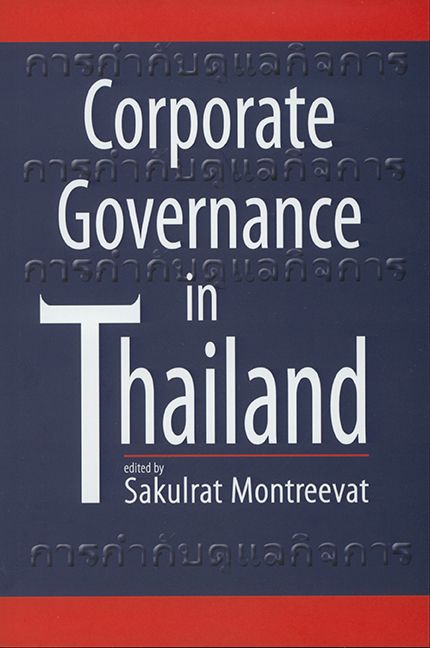Book contents
- Frontmatter
- Contents
- List of Tables
- List of Figures
- List of Abbreviations
- Acknowledgements
- Contributors
- Introduction
- 1 Transparency and Accountability of Listed Non-Financial Companies in Post-Crisis Thailand
- 2 Good Governance in the Thai Banking System
- 3 Corporate Governance among State-Owned Enterprises in Thailand
- 4 Thai Company Laws and Good Governance Practices of Unlisted Companies
- Concluding Remarks
- Index
4 - Thai Company Laws and Good Governance Practices of Unlisted Companies
Published online by Cambridge University Press: 21 October 2015
- Frontmatter
- Contents
- List of Tables
- List of Figures
- List of Abbreviations
- Acknowledgements
- Contributors
- Introduction
- 1 Transparency and Accountability of Listed Non-Financial Companies in Post-Crisis Thailand
- 2 Good Governance in the Thai Banking System
- 3 Corporate Governance among State-Owned Enterprises in Thailand
- 4 Thai Company Laws and Good Governance Practices of Unlisted Companies
- Concluding Remarks
- Index
Summary
Since the 1997 Asian financial crisis, the Thai government has launched a number of measures to reform corporate governance so as to restore investors’ confidence and to speed up recovery from the deep recession. Those measures focus mainly on promoting good corporate governance practices in public listed companies. Not much attention has hitherto been paid to corporate governance among the unlisted companies. Nonetheless, it is undeniable that unlisted companies constitute the majority of the country'sbusiness enterprises and play a crucial role in the country'ssocial and economic development. Hence, there is a need for research into corporate governance among the unlisted companies.
The aim of this chapter is to find appropriate solutions to strengthen corporate governance in unlisted companies in Thailand. The first section provides an overview of Thai company laws. This is followed by a comparative study of the statutory framework of corporate governance between Thai company laws and the Organization for Economic Cooperation and Development Principles of Corporate Governance (hereinafter, the “OECD Principles”) in Section 2. Section 3 discusses the mechanisms for ensuring good corporate governance practices in Thai companies. The last section includes comments and recommendations for promoting greater corporate governance in unlisted companies in Thailand.
An Overview of Thai Company Laws: Statutory Framework of Corporate Governance
Thai company laws are composed of two pieces of legislation: one is the Thai Public Limited Companies Act 1992 (be 2535) as amended by the Thai Public Limited Companies Act (No. 2) 2001 (be 2544) (hereinafter, the “PCA”); and the other is the Thai Civil and Commercial Code, Title XXII, Partnerships and Companies (hereinafter, the “CCC”).
PCA
The PCA is the law governing public limited companies or companies set up for the purpose of offering shares for sale to the public. The liability of the shareholders of such companies is limited up to the amount paid on the shares owned. In establishing a public limited company, 15 or more natural persons may act as promoters by preparing a memorandum of association and proceeding further in accordance with the PCA.
- Type
- Chapter
- Information
- Corporate Governance in Thailand , pp. 85 - 109Publisher: ISEAS–Yusof Ishak InstitutePrint publication year: 2005



